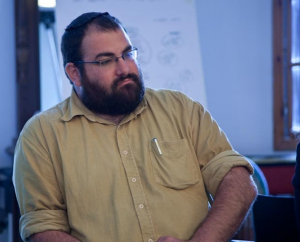Breaking the Silence
- March 12th, 2009
- Posted in Impressions
- Write comment
Yehuda (Judah) is a former IDF soldier who is also an orthodox Jew, which makes him a bit more to the right, by background, then many Israelis who question some Israeli policies. His sister is a settler. But, when Judah came back from his mandatory 3 years of service, as a sergeant and platoon leader, he wondered if what he had done had been right. His question to himself was, “where is the moral boundary beyond which Jews defending the state of Israel should not go?” He also wondered if most Israelis knew, understood, or cared what the army was doing on their behalf in the occupied territories. While there is probably no Israeli Jew who would not defend Israel’s right to exist as a Jewish democracy and who would understand defending threats within Israel’s pre-1967 borders, most probably don’t realize that many of the actions taken in the territories do not have a defensive character.
 I am already getting more political than Judah. He came back from serving in Hebron wondering if what he had done was right. Starting with his own platoon, he asked others how they felt and many felt the same way. They collected photos and videos of their service in Hebron and mounted an exhibit at the Israel Museum (or was it the Tel Aviv museum?) in 2005. It quickly became the talk of all Israel.
I am already getting more political than Judah. He came back from serving in Hebron wondering if what he had done was right. Starting with his own platoon, he asked others how they felt and many felt the same way. They collected photos and videos of their service in Hebron and mounted an exhibit at the Israel Museum (or was it the Tel Aviv museum?) in 2005. It quickly became the talk of all Israel.
Hebron is a challenging place. It was an Arab village through 1967 that was occupied after the Israeli victory in the 6 day war. Hebron contains the Tomb of the Patriarchs, which allegedly is the burial spot of Abraham/Ibrahim and Isaac and is holy to both Muslims and Jews. The Taliban-esque Rabbi Levinger decided that Jews should recover the tomb, with approval of the government of Israel and military leaders in charge of the occupation. The history of the settlement is told in Gershom Gorenberg’s masterful The Accidental Empire.
Now, Hebron has a settlement of 800 Jews more or less in the middle of an Arab village of 16,000. Most of the other West Bank Israeli settlements are distinct villages or small cities that are separated from Arab villages. But, here some Israeli Jewish houses and Arab houses share walls. The settlers are mostly orthodox and ultra-orthodox. They carry machine guns. They frequently taunt and interfere with the Arabs. The army is there to protect the settlers but more than occasionally finds itself defending the Arabs from the settlers—and then getting abuse from the settlers for defending the wrong people.
So, Hebron is a tough neighborhood. Judah started Breaking the Silence to enable soldiers who had been stationed in Hebron to recount specific facts about what they had done in Hebron. He gave us two examples:
…when you see a bag in the middle of the street you don’t know if it is a bomb or just a bag of garbage. How do you tell? You can do one of three things: You can shoot it from a distance and if it is a bomb it will blow up. You can call a demolition engineer to examine and dismantle it. You can grab a Palestinian off the street in the day—or pull someone out of their house at night—and have the Palestinian pick it up and carry it away—and he’ll blow up if it is a bomb. So, which happens the most often? Number 3—it’s easier; it shows who is in charge; it adds a little excitement to boring duty. And it’s wrong.
… a lot of missions involve breaking into someone’s house to arrest someone or to search the house. But, you don’t go directly to the suspect house. You go the neighbor’s house and then you drag the neighbor out of his house and hold him in front of you when you knock down the door of the suspect house. This is called “bringing a neighbor along.” It was challenged by an NGO in the High Court of Justice and made illegal. But, does it stop? Of course not. Now you “bring a friend…”
I have a book of these reminisces and it just makes me sick to read them. Is this worse than what the Americans do in Iraq? Or what the Serbians did in Bosnia? Or what any other occupying army does? As Judah put it, “That’s not the point. It’s not what Israelis should be doing.”
You can see some of this for yourself at: http://www.breakingthesilence.org.il
I, too, was overwhelmed by Judah and the testimony of the soldiers. It is a vivid glimpse into what happens when good people are trapped by a military machine that takes on a life of its own. The important thing to realize is these soldiers end up feeling so powerless that they become numb. Breaking the Silence enables them to feel human again. I am glad NIF funds this group.
Hebron was made ‘Judenrein’ when the Arab population slaughtered their Jewish neighbors in a pogrom in 1929. The survivors fled in terror. Prior to that time, Hebron was nearly one-half Jewish.
Hebron is also in the territory allocated to Israel as part of the 1947 partition plan. It was captured by Jordan when Arab armies attacked in 1948. So its recapture in 1967 merely re-established the situation to where it was originally supposed to have been.